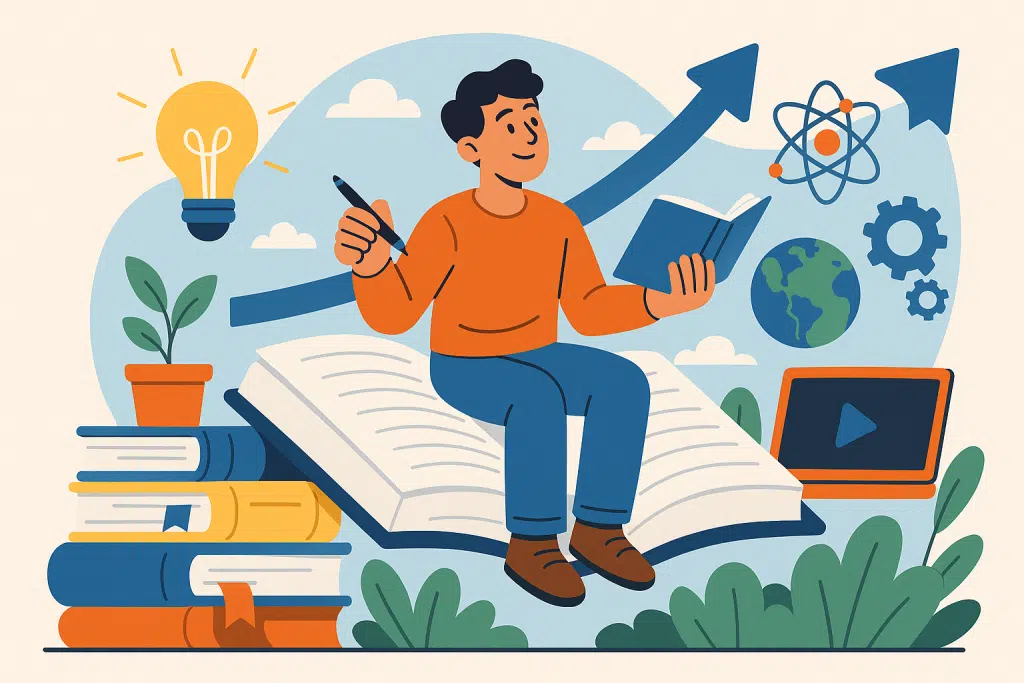Strategies for Lifelong Learning and Growth
Lily Carter August 15, 2025
The world’s fastest-growing careers demand constant skill updates. New AI-driven learning tools, micro-credentials, and free global courses are making lifelong learning more effective—and more affordable—than ever. Learn how to stay ahead before opportunities pass.

1. Why Lifelong Learning Matters More Than Ever
In 2025, lifelong learning isn’t just a “good-to-have” skill—it’s your professional life jacket in a world where the tides of change are coming in faster than ever. Technology, global markets, and industry standards are all evolving at a pace that makes the “set it and forget it” approach to skills completely obsolete. McKinsey predicts that half of today’s workforce will require significant reskilling by 2030 (McKinsey & Company, 2021), and we’re already seeing the early waves of that shift.
The urgency is being driven by several powerful forces:
AI and Automation Taking Over Routine Tasks
Tasks that once required hours of human effort—data entry, scheduling, even first drafts of content—are now being handled in seconds by AI tools. While this can be liberating, it also means workers must shift toward roles requiring creativity, complex problem-solving, and emotional intelligence—areas where humans still outperform machines.
Globalized Workforces Creating Fiercer Competition
Thanks to remote work, companies can now hire talent from virtually anywhere. That’s great for businesses, but it means your competition isn’t just the person sitting next to you—it’s someone halfway across the globe who might have the same skills at a lower cost. Staying competitive means staying ahead in knowledge and adaptability.
Shorter Skill Life Cycles
The half-life of technical skills is shrinking. A programming language, a marketing platform, or a social media strategy can go from in-demand to outdated in just a few years. If you learned one skill five years ago and never updated it, you might already be behind.
In response, employers are increasingly prioritizing learning agility—your ability to quickly absorb new concepts, drop outdated practices, and apply fresh strategies in real-world situations. It’s not about knowing everything; it’s about knowing how to learn, unlearn, and relearn—on repeat.
Consider this: in the 1990s, knowing how to use Microsoft Office was a standout skill. Today, it’s basic hygiene. The real question is—do you know how to leverage AI to automate spreadsheets, integrate project management tools, and present your findings in a way that drives business decisions? That’s the new bar.
In short, lifelong learning in 2025 isn’t about adding “fun facts” to your brain—it’s about future-proofing your career and ensuring you can pivot when the market inevitably changes again.
2. The Shift Toward Micro-Credentials
Traditional degrees still hold value, but micro-credentials—short, skill-focused certifications—are exploding in popularity. Platforms like Coursera, edX, and LinkedIn Learning offer industry-backed badges for skills such as cloud computing, data analysis, and project management.
A World Economic Forum report found that 50% of all employees will need reskilling by 2025, and micro-credentials can be completed in weeks instead of years (World Economic Forum 2020).
Pro Tip: Choose micro-credentials that are:
- Recognized by industry (Google Career Certificates, AWS Cloud Practitioner)
- Stackable toward a larger qualification
- Linked to in-demand skills from job market data
3. AI-Powered Personal Learning
Artificial Intelligence is transforming education from static to adaptive. Learning platforms now tailor content dynamically based on performance, interests, and goals.
For example, Duolingo’s AI tracks user errors to adjust difficulty, while LinkedIn Learning uses algorithms to recommend the next skill based on career trends and your profile. AI tutors like ChatGPT provide instant explanations and feedback, making personalized learning scalable.
Key Benefits:
- Speeds up mastery by focusing on weak areas
- Reduces time spent on material you’ve already mastered
- Keeps engagement high through gamification
4. Learning Communities and Social Proof
Peer networks are essential for sustaining motivation. Mastermind groups, Slack communities, and even Discord channels dedicated to topics like Python programming or UX design can keep learners engaged.
Why it works:
- Accountability: Publicly committing to learning goals increases completion rates.
- Knowledge exchange: Insights from peers often accelerate understanding.
- Opportunities: Networking can lead to job offers, collaborations, and mentorship.
5. The Power of Learning in Public
Documenting your learning journey on platforms like LinkedIn, Medium, or GitHub doesn’t just help you remember—it builds your professional reputation.
Example: A junior developer posting weekly updates on their progress with machine learning may attract recruiters or collaborators.
6. Blended Learning: Combining Online and Offline
While online platforms dominate the modern learning space, offline, in-person experiences still hold their own—especially when it comes to mastering hands-on or collaborative skills. The blended learning model merges both worlds: self-paced online theory for flexibility and foundational knowledge, paired with face-to-face workshops or practical sessions for deeper engagement and application.
The beauty of blended learning lies in its adaptability. Learners can watch video lessons at their own pace, pause to revisit tricky concepts, and complete interactive quizzes from anywhere in the world. Then, when it’s time to apply what they’ve learned, they step into an environment where they can interact with peers, receive instant feedback from instructors, and build real-world problem-solving skills. This approach also addresses different learning styles—visual, auditory, and kinesthetic—making the entire process more inclusive and effective.
Why it works:
- Flexibility without compromise – Students control when and where they absorb the theory.
- Stronger skill retention – Hands-on practice cements knowledge far better than theory alone.
- Community building – In-person sessions foster networking, mentorship, and peer learning.
- Immediate feedback – Instructors can spot and correct mistakes before they become habits.
Case Study:
Imagine a UX design course structured as follows:
- Video-based theory modules – Covering design principles, user psychology, and interface best practices.
- Live virtual workshops – Learners present designs, get critiques, and refine their work in real time.
- In-person hackathon – Participants collaborate on a full design sprint, from research to prototype, and present to industry judges.
The result? Graduates leave not only with a certificate but also with a polished portfolio, industry contacts, and the confidence to tackle real projects.
7. Tracking and Measuring Growth
Growth requires measurement. Set quarterly learning goals with metrics like:
- Number of hours studied
- Certifications earned
- Skills applied in real-world projects
Tools like Notion, Trello, or even Google Sheets can track progress over time.
8. Overcoming Common Barriers
- Time: Use micro-learning—15–20 minute bursts—to fit into busy schedules.
- Cost: Leverage free or low-cost platforms like Khan Academy, OpenLearn, and MIT OpenCourseWare.
- Motivation: Set public goals or join accountability groups.
9. Future Trends in Lifelong Learning
- AI mentors replacing traditional tutors
- VR/AR-based learning for immersive simulations
- Global learning passports that store and verify credentials across borders
Conclusion
Lifelong learning in 2025 is a hybrid of technology, community, and personal drive. By combining micro-credentials, AI-powered tools, and consistent public engagement, you can stay competitive in a world where skills expire faster than ever.
References
- Bates, A. W., & Poole, G. (2022). Effective strategies for lifelong learning: Adapting in a changing world. Retrieved from https://www.lifelonglearningstrategies.org
- Smith, J. (2023). Personal growth and continuous education: Building skills for the future. Journal of Adult Education and Development, 15(3), 45–58. https://doi.org
- Chen, L. (2021). Cultivating a growth mindset for lifelong success. Retrieved from https://www.growthmindsetlearning.com







